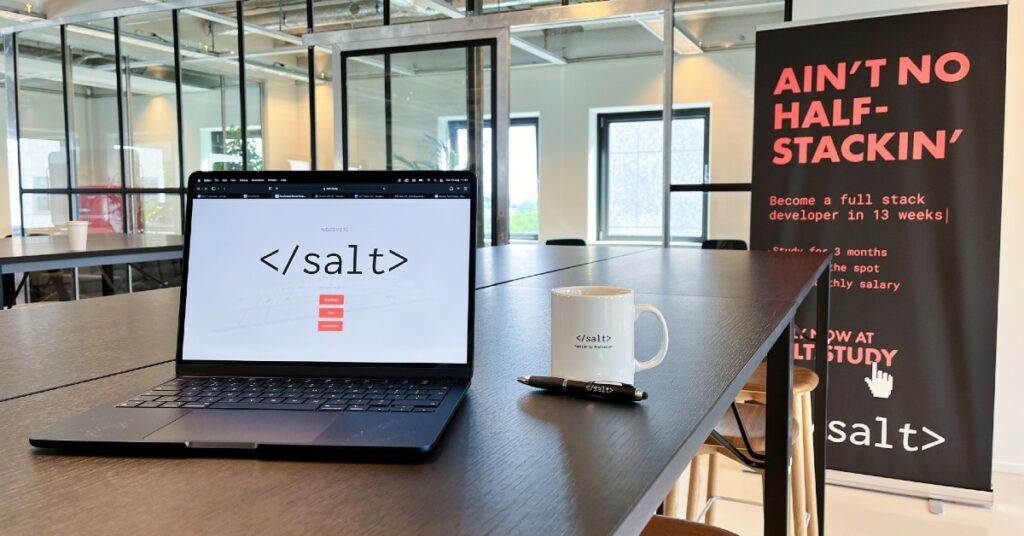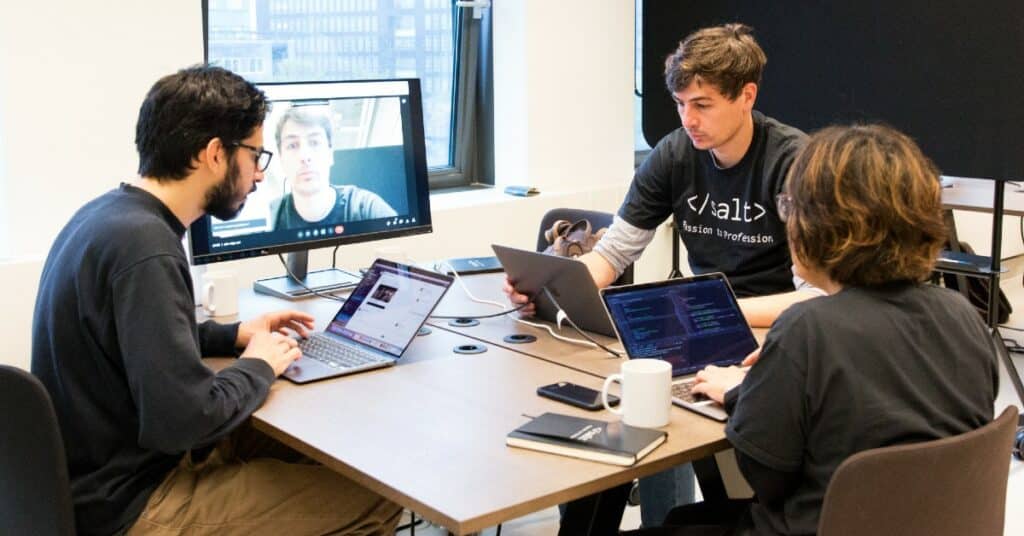Talent shortage has been globally cited as the most significant barrier facing IT executives right now. A Gartner report saw IT executives list shortage of tech talent ahead of cost and security as barriers for adoption of 64 per cent of emerging technologies.
With increased pace of digital transformation and global demand for technology, there is increased demand for tech talent to build and maintain digital infrastructure. While upskilling and reskilling existing workforce has proven to be a good tool to combat this challenge, it is just not enough.
The Dutch education system is already preparing students for a wide range of occupations with its secondary vocational education (MBO) programme. However, there is an even more prudent option available right now and it’s called SALT.
SALT (School of Applied Technology): what you need to know?

SALT was founded by Koshi Hamedi, Richard Andemark, and Max Hamedi in 2018 as a platform offering accelerated career programmes to full-stack developers in Stockholm, Sweden. Tech talent shortage problem can be closely associated with the lack of quality developers readily available.
Located in the heart of Stockholm and in Amsterdam, SALT (School of Applied Technology) is addressing the extreme shortage of technology professionals in Europe. “Our mission is to train new technology professionals to strengthen the European talent pool,” the scaleup explains on its LinkedIn page.
Since its inception, SALT has trained over 450 full-stack developers and helped over 100 clients successfully expand their development teams. In other words, SALT not only trains people on accelerated learning to become full-stack developers but also helps them find a fully paid job after completing their course.
SALT carefully selects the candidates joining its accelerated learning programme and they are then enrolled into an immersive bootcamp of three months. During these three months, they are trained on more than 500 hours of coding. Once they are successful, SALT employs them before passing them to another organisation for a year.
As a funded scaleup, SALT has been able to help its clients which not only includes startups and scaleups but also established tech companies such as TUI, Klarna, Viaplay, and Incentro. Once an employee completes one year with the selected organisation, they can be hired on a permanent basis without any fee involved.
A look at the co-founders of SALT
The co-founders of SALT have themselves been part of the tech industry and have seen the talent shortage from the front row seat. Their individual success stories have made them key players in Europe’s tech ecosystem, but they have also seen how a lack of developers has hampered the growth of companies.
Their way of addressing this problem is SALT, which is abbreviated as , a nod to the closing tag in Standard Generalised Markup Language (SGML) that preceded the likes of XML, HTML, and XHTML.
Before starting SALT, Koshi Hamedi built the global 3D company Donya Labs, which was acquired by Microsoft in 2017. He came to Sweden in the 80s as a refugee and built one of Sweden’s fastest growing technology companies. He currently serves as the director of strategy at Microsoft.
Max Hamedi is a postdoctoral research fellow at Harvard University & Associate Professor at the Royal Institute of Technology in Stockholm. He is also called the in-house doctor and professor looking for future technologies and leads SALT’s efforts to offer “the best applicable technology training possible.”
Richard Andemark launched a global SaaS company at the age of 25 and now serves as the CEO of SALT. His Finland-based SaaS company reached profitability in just six months and was responsible for launching the US operations of Donya Labs in San Francisco and achieving exponential revenue growth.
How does SALT’s accelerated career programme work?
There are essentially five steps before someone gets selected to join SALT’s accelerated career programme to become a full-stack developer. Here is a look at these steps:
- Application: The first step is for an interested candidate to send in their application and explain why they are a “passionate hobby coder” that SALT is currently looking for
- Recruitment process: The second step is a recruitment process that involves tests, phone interview, group interview, and a workshop
- Coding education: The selected candidates are then sponsored by SALT for a 3-month full-time coding education
- Consultant position: Once a candidate graduates from this three month programme, they are offered a consultant position within SALT’s own hiring network and even offered a salary of €3,000 per month. After working with SALT initially, the candidates are matched with an organisation to work for twelve months.
- Permanently hired: If a candidate performs well for twelve months, they are permanently hired by their new company
In many ways, the programme being offered by SALT is similar to the talent development programmes run by top F1 teams. The likes of F1 talent such as Carlos Sainz and Charles Leclerc have been trained under the leadership of teams like Red Bull Racing and Ferrari, to be loaned to teams like Renault and Sauber, respectively.
Bootcamps and Diversity

At the time of writing, SALT is offering three different bootcamps – JavaScript Fullstack, Java Fullstack, and .NET Fullstack. The application is now closed for the class of winter 2023 for all the three bootcamps, but SALT will reopen applications in January for summer courses.
JavaScript plays a vital role and runs everywhere, including browsers, phones, cars, and even TVs. Java, on the other hand, powers many of the biggest applications, including those from Klarna and Spotify. .NET continues to lead the back end development world and has undergone multiples in the last couple of years.
Apart from these bootcamps to bring fully skilled developers to the workforce, SALT is also focussing on bringing diversity in the European tech industry. “We believe that professional organisations should mirror the population’s diversity,” the scaleup says on its website.
SALT aims to achieve this through its accelerated career programme, which eliminates the need for spending a lot of time learning programming. The co-founders believe that their programme will increase the number of women and new Europeans in tech. SALT says 44 per cent of its developers are female and represent more than 30 different nationalities.
The road ahead
SALT began its operations in Amsterdam during the middle of 2022 and currently has 30 developers. It has built an experienced team to support Amsterdam’s tech ecosystem and serial entrepreneur Boudewijn Verkerk is leading the operations as the country manager.
While SALT does not disclose its investors, the scaleup is sufficiently funded to support its future ambition. It wants to expand its experienced core team in Amsterdam and has set a goal of reaching 200 developers in Amsterdam in 2023. There is also focus on supporting upskilling, mobile programming, and deep learning.
The common table salt is salty while magnesium sulphate is bitter, but this SALT aims to add sweetness in the form of accelerated career in the lives of those looking to build a career in technology. In many ways, this could be the future of learning as the gap for tech talent widens and traditional methods fail to fill that void.










01
From telecom veteran to Dutch Startup Visa success: The Jignesh Dave story